(From this point the BBC's statement runs in the left-hand
column, and our comments in the right-hand column.)
BBC
On the first charge concerning programme policy the Spectator says : Yugoslav listeners have many times asked for specific comments on various events at home'; this is not true. The Spectator then cites the Case of Desmond Clarke who, in the late 1940s and early 1950s, used to give commentaries on Yugoslav affairs, and who is alleged to have been silenced after Yugoslav press criticism. Desmond Clarke himself explained in a letter to the Spectator, published on November 6, 1959, why he gave up his commentaries. He wrote : 'The fact is nobody silenced me. I silenced myself. It is true that our Embassy in Belgrade was beginning to feel that my commentaries were tactless and even officious. But I might still be broadcasting to Yugoslavia, perhaps less censoriously, had I not decided for personal reasons to leave the BBC.' Next it is stated that 'when Yugoslavia voted with the Soviet group against the UN resolution on Hungary there was no comment on this fact in the Yugo- slav broadcasts.' In fact the Yugoslav vote on Hungary in the UN was fully reported in the news and there was also extensive coverage in the Yugoslav Service of the UN Hungarian debates in news, press com- 4'2ot, and commentaries. No one listening to the Service could have been le -t in the least doubt about the British attitude to the UN vote. Next
BBC
it is stated that the Yugoslav Service was silent about the trial and sentence of Krekic and other Social Democrats two years ago. This is not true. The trial and sentence and the British and other reactions to them were reported at length in news, press reviews and comment. Next there is a statement that when the BBC commissioned a talk by a member of the Yugoslav Service about Yugoslavia it was not broadcast to Yugoslavia but was broadcast to other countries. The talk was in fact commissioned precisely for this purpose and was not put in terms suitable for broad- casting to Yugoslavia. This is a general practice which is regularly adopted in situation reports about a country in the news, whether it happens to be France, the US, the USSR or any other. Next, a very recent commentary by Mr. Walter Kolarz on Church-State relations in Yugoslavia, which was broadcast in the Yugoslav Service, is attributed to a change of heart in the Yugoslav Service induced by the Spectator's criticisms. The Spectator's criticisms had nothing to do with it. This talk was commissioned both for the Yugoslav Service and for other European Services because the Church-State situation had changed as a result of the death of Cardinal Stepinac. It happens in fact comparatively rarely that Yugoslav internal affairs are of sufficient general interest to warrant British comment. When they are, comment is given appropriately in the Yugoslav and other services either in the form of press reviews or in commentaries as in the above instance.
One of the means by which such comment is given is in monthly round-ups of press comment. These, of course, can only be given when there is sufficient interesting material about Yugoslavia in the press. This is often not the case. Contrary to the Spectator's statement, such a round-up was given to Yugoslav listeners in December, but in January and February there was not enough material. The case of the Social Democrat leader, Dusan Popovic, who died in 1918 and whose bones were disinterred from England and reinterred in Yugoslavia last December, is cited by the Spectator as calling for comment. It was con- sidered for comment and not regarded as sufficiently interesting or important.
Finally there are the Spectator's criticisms of the Yugoslav Service's treatment of the trial of Milovan Djilas and of his book The New Class in 1957. This was indeed a subject on which there was considerable dis- cussion within the BBC and over so difficult and delicate a matter there are bound to be differences of opinion on the action taken. The decision noted by the Spectator not to broadcast extracts of The New Class to Yugoslavia was reached after careful consideration and has since re- mained a subject for argument within the BBC. The publication of the book was, of course, covered in the news; full summaries of reviews were given which contained the gist of the argument and some quota- tions; there were also press reviews giving reactions to the book. These various broadcasts were both favourable to the book and unfavourable. An unfavourable one was that of the article by Barbara Castle in the New Statesman of August 10, 1957, to which the Spectator has referred. The Spectator represents Mrs. Castle, in a letter in the New Statesman and Nation of October 5, 1957, as withdrawing her unfavourable opinion. of Djilas's picture of Yugoslavia and as saying of it 'may I now express my deep disappointment that I was wrong. . . . Apparently I spoke too soon and too optimistically.' In fact Mrs. Castle was referring to another matter, namely •that she had spoken too soon and too optimistically about the permission to Vladimir Dedijer to travel abroad since he had later been refused a visa to come to Manchester University. Of Djilas's book, Mrs. Castle wrote in her letter : 'I did not like the book, but I am certain that the proceedings on account of it would do more harm to Yugoslavia than the book could ever do.' It is arguable that Mrs. Castle's letter should all the same have been used but that is no excuse for the Spectator giving it quite another meaning.
To return to Djilas's trial, the Spectator refers to the editing down of a reference to it in a survey of the international events of the week. The survey was, of course, not designed specifically for Yugoslavia and the responsible editor cut part of the passage on Djilas as well as other passages in order to give, in his words, 'a fair and balanced view of the important international events of the week.' On this highly contro- versial subject, about which opinion, understandably, is sharply divided, the over-all picture given by the Spectator of the Yugoslav Service's treat- ment of the Djilas affair is wholly misleading. British opinion, including that of the Labour Party, was fully given in news and press comment, As to the second main charge, regarding the employment of Yugoslav
BBC
Communist contributors and staff, the Spectator writes : 'The Yugoslav Communist point of view is regularly given an opportunity of expressing itself.' The Spectator then refers to broadcasts by Yugoslav visitors to this country. In fact Yugoslav visitors are used, not to express any Com- munist point of view, but to report on events, entertainments, places of interest and activities which they have seen in the UK. This is a com- paratively small but valuable contribution to the extensive 'Projection of Britain' material broadcast in the Yugoslav Service.
There are,' says the Spectator, 'people in Yugoslavia who complain that the BBC is nothing else but an extension of the Yugoslav News Agency and one can hardly be surprised.' This remarkable statement is supported by two alleged cases, of which the more recent one is five years old and the other is seven. Kirigin, a Yugoslav journalist then in London, was tried out in two or three 'Letters from London'—introduced as personal expressions of opinion—before he returned to Yugoslavia in 1953; and the experiment has not been repeated. In the BBC's files no trace can be found of the Yugoslav trade unionist who is said to have commented on the big dockers' strike of 1955.
Next under this heading the Spectator writes, 'Not all visitors to Britain are welcome to the BBC. Not, for example, Vladimir Dedijer. He was in this country in the spring of 1957 and delivered a notable lecture at London University. He also apparently approached the Yugoslav Service but his request for time to deliver a talk was turned down. The BBC was in fact following the lead of Radio Belgrade and the Yugoslav press in denying Mr. Dedijer the right to state his case.' It is not true that Mr. Dedijer approached the Yugoslav Service with a request to broadcast. He was in fact asked to broadcast after his lecture and said that he would prefer not to.
Finally, we come to the most serious charge of all—that relating to staff. The Spectator writes, 'In order to establish "better relations" with the Yugo- slav regime a system whereby staff is brought over from Yugoslavia for terms up to five years was instituted in 1954.' This is untrue. No such scheme of recruitment has ever been used for the purpose alleged by the Spectator. In fact, recruitment under the short-term contract system has caused con- siderable dispute with the Yugoslav authorities and still does so. The employment of language staff on short-term contract was started soon after the war (in 1948) and is applied to the great majority of the BBC's forty external services.
Its aim is to improve the quality of the broadcasts by recruiting and training good announcers and translators with up-to-date experience of the changing linguistic usages of the countries from which they come and to which their particular Services are directed. Yugoslavia is the only Com- munist country to which the system can be applied. Of the present Yugo- slav programme staff of eleven, only two are employed under this system. Naturally the BBC is aware of the pressures to which citizens of totalitarian countries are subject in such circumstances.
'These people,' writes the Spectator, 'can keep the Yugoslays informed about the day-to-day programmes and decisions, about the visitors who come from Yugoslavia, about correspondence of the section with Yugo- slavia, etc., and about the other members of the section and their views and comments.' The Spectator also suggests that Listener Research reports containing names and addresses of correspondents in Yugoslavia might be handed over to the Yugoslav Embassy. In fact, Listener Reports contain no names and addresses; and the letters themselves to and from listeners are handled with due regard for security and have strictly limited circulation. The staff in question could tell the Yugoslav Embassy nothing of import- ance even if they wanted to and they could know nothing confidential about the correspondence with Yugoslavia.
As announcer-translators and occasional reporters these members of the staff on short-term contract from Yugoslavia perform a most valuable service, but they do not, as suggested in the Spectator, have any influence on broadcasting policy. It is stated that the news of the death of Bishop Velimirovic in March, 1956, was dropped from a Yugoslav bulletin as a result of the intervention of one such member of the staff. In fact it was dropped from the bulletin by the responsible editor in the News Room, because there was uncertainty about the item's importance as news. When the Bishop was buried a report was given with obituary material.
Secondly it is stated that in reports on Wimbledon in 1959 the name of Branovic, a lawn tennis player who had left Yugoslavia and gone to Western Germany, was omitted from the list of the German team. In fact Branovic was not entered by the Federal German Lawn Tennis Association and therefore in no sense was he a member of the West German team. Thirdly,
BBC
a member of the staff is said to have wilfully mistranslated a news item about the death of Cardinal Stepinac. The item as originally written,' writes the Spectator, 'referred to the fact that Stepinac had been sentenced to imprisonment "for alleged collaboration with the Nazis?' She trans- lated it "for collaboration as established by the court with the Nazis."' Since this incident is so recent it has been possible to examine it in full detail. The news story in English did indeed say that the Cardinal was sentenced 'for alleged collaboration with the Pavelic regime.' This, as the responsible news editor agrees, was a loose and inaccurate formula. The Yugoslav translators discussed how it should be rendered and suggested that 'alleged' should be translated 'po nalazu suda.' This does not mean, as is suggested in the Spectator, 'as established by the court,' which would carry the implication that the court was right; it means 'according to the finding of the court,' which carries no such implication. An apology is especially due to the translator, named by the Spectator, against whom the allegation was made.
In the ensuing paragraph the Spectator writes, 'The exchange of staff is purely imaginary. Traffic is one-way.' It is not at all clear what is meant by this, but it seems to rest on a confusion between the short-term contract system and the exchanges of staff with the Yugoslav Radio as with many other radio organisations, which have taken place for much shorter periods. In fact the Yugoslav Radio is always eager for such exchanges since Yugoslav Radio personnel have more to learn from the BBC than BBC staff have from Yugoslav Radio. But the BBC is rarely able to recipro- cate owing to the shortage of Serbo-Croat-speaking staff.
The Spectator quotes one abortive attempt at such an exchange: Mr. Valentine when he went to Yugoslavia was indeed approached by the UDBA, or Security Police; they tried to put pressure on him and he at once left the country. The BBC did not, as the Spectator states, hush the matter up, but protested strongly to Zagreb Radio, which denied respon- sibility; the BBC also urged that representations should be made to the Yugoslav Government. But this exchange system has nothing in common with the short-term contract system, since the Yugoslays who come here for periods up to five years are, of course, members of the BBC staff and not the staff of the Yugoslav Radio.
One of those who came over under the short-term contract system was Mr. Gregovic. His contract was terminated after a six-month proba- tionary period. It is not the practice of the BBC to publish the reasons for. such decisions but the account given by the Spectator is a gross distortion. For example it is not true that the BBC authorities, as the Spectator puts it, 'tried hard to put pressure on him' not to ask for asylum; on the contrary it was they who suggested to him that he should get in touch with the Home Office on this matter. Representations from Belgrade Radio had nothing to do with the ending of Mr. Gregovic's contract.
The reader will conclude for himself whether the facts justify the use by the Spectator of such phrases as 'a permanent Communist cell at Bush House' or the description of the Yugoslav Service as 'a kind of super- numerary PRO for Titoism in this country.' The Spectator has drawn its allegations from the output of the Yugoslav Service over seven years. During those seven years the Yugoslav service has broadcast thirty million words. And the judgment of course lies ultimately with the listeners in Yugoslavia.
The Spectator, for its own 'listener research,' has relied solely on an item in the Schweitzer Radio-Zeitung. According to this item : 'For some time past a transmission in Croat by the Spanish Radio has been highly popular among Yugoslays . . . in Serbia too, listening to Madrid appears to be no less widespread. The transmissions of the BBC on the other hand are rejected by many Yugoslays as being pro-Tito. The Yugoslav programme of Radio Paris and the Voice of America are more popular.' From this single piece of evidence the Spectator draws the conclusion that the BBC broadcasts 'attract fewer listeners• than any other broad- casting service beamed at Yugoslavia.' The item in the Schweitzer Radio- Zeitung on which this statement is based is signed XYZ. In the same number of the paper (July, 1958) the same XYZ states that an anti- Communist radio station on Rumanian territory could be repeatedly heard in the West spreading freedom slogans. From no other source has there been any evidence for such an illegal transmitter on Rumanian territory.
It happened that shortly before that issue of Schweitzer Radio-Zeitung went to press the BBC in March-April, 1958, was carrying out a Listener Research competition in Slovenia. Two hundred and sixteen of the
BBC
listeners who took part in this competition spontaneously referred to listening to other foreign stations besides the BBC, seventy-six of them mentioned the French Radio, forty-seven the Voice of America and only one mentioned Radio Madrid. In the BBC Serbo-Croat Listener Competition in March, 1959, thirty-three entrants mentioned listening to other stations; thirteen mentioned Voice of America, ten Radio Paris and again one mentioned Radio Madrid.
Among the many hundreds of listeners' letters received by the BBC some make comparisons with other stations and, although nine out of ten prefer the BBC, one or two have mentioned preferences for Radio Paris or Voice oof. America. In no case has Radio Madrid been given favourable mention The The Slovene listener competition, March to April, 1958, gave the most decisive evidence of the popularity :of the BBC. There were more than 1400 entries. That is to say one in five hundred of the adult population of Slovenia was willing to take any risk involved and to pay high postal charges in order to comment on the BBC's broadcasts. The overwhelming majority of the comments showed warm appreciation of the Service, par- ticularly with regard to news and political commentaries. Similar reactions Come from other parts of Yugoslavia in hundreds of letters, also in reports from visitors and in reports reaching the BBC through the British Embassy. The British Information Services, in normal times, issue daily to Yugo- slays many thousands of copies of BBC news bulletins; and it is reckoned that each is seen by at least three people. In times of crisis the number is greatly increased. In addition, thousands of copies of the BBC's (Yugo- slav) English by Radio lessons are issued. The circulation of London Calling Europe (the programme bulletin of the BBC's European Services) in Yugoslavia is 9,101 copies. These facts and figures give some indication of what the judgment of Yugoslav listeners on the BBC Yugoslav Service would be.

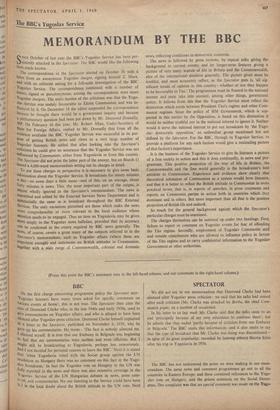
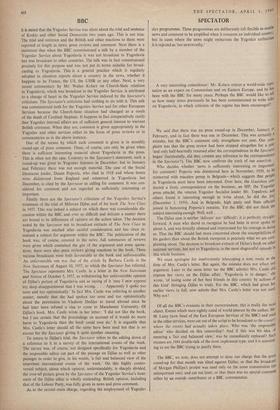
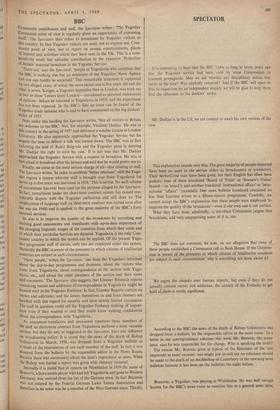
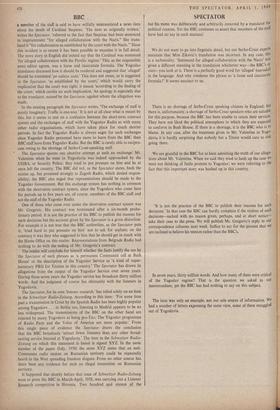
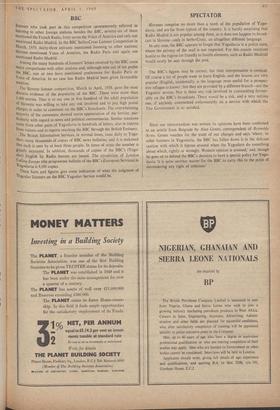
































 Previous page
Previous page